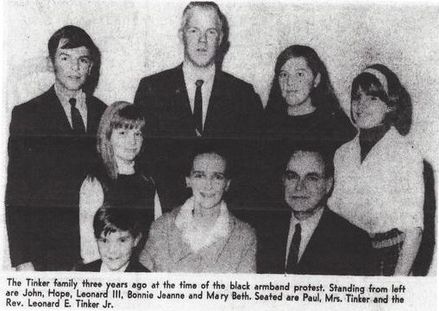Ordinary Kids
|
MARY BETH TINKER
A “popular and good student” of Warren Harding Junior High, Mary Beth Tinker enjoyed singing, speech contests, and school dramas. |
Source: North High yearbook-Polar Bear, 1965-1968
|
|
Source: North High yearbook-Polar Bear, 1965-1968
|
JOHN FREDERICK TINKER Quiet and “Quaker like,” John Tinker of North High School participated in school dramas and enjoyed playing sousaphone and violin in the school bands. |
|
CHRISTOPHER PAUL ECKHARDT
"A regular kid," Christopher Eckhardt of Roosevelt High School enjoyed sports and political discussions. "Elected representative to student government, president of two separate school students’ councils and member of track team. Outside of school, he was a Boy Scout and a youth leader at church, had a paper route and a lawn mowing/snow-shoveling business and member of 'All Center Bums', a social club." |
Source: Roosevelt High School yearbook- Roundup, 1965-1968
|
Childhood
"A favorite prayer of our family was the prayer of St. Francis: ‘Lord, make me an instrument of thy peace, when there is hatred let me sow love.’"
- Mary Beth Tinker
|
Inheriting their parents’ values from an early age, both Mary Beth and John Tinker grew up with passion for human life and racial equality. Their parents’ employment problems due to their participation in controversial civil rights demonstrations deeply affected the children. |
"Back then, my mother had a master’s degree in psychology, and she was teaching at the small Lutheran college, Grand View College. She started organizing against the Vietnam War at the college. So she got fired from her job at Grand View. But my mother kept it up. She was removed from four or five colleges, like Drake University."
- Mary Beth Tinker
In 1957, their father lost his job at the church for his views on integration, forcing a move from Atlantic to Des Moines, Iowa. In 1962, another Methodist Church removed their father because of his political beliefs. In the conservative Iowa, both children distinguished themselves for their own views against social segregation despite facing humiliating remarks like “nigger lovers,” “there go the Tinkers again,” and “coward.”
"In the fourth grade, Mary Beth made a speech "Is Peace Possible"... at least she wrote it. But before she gave it, the teacher felt it was too controversial of a topic, so referred it to the Superintendent of the School's office, and Dr. Peterson decided she couldn't make it, because it was too controversial. She spoke on ‘Hiroshima’ instead!"
- Leonard Tinker
Resilient like their parents, both never wavered in their values despite hostilities.
"I remember there were a lot of civil right demonstrations that we all took part in, my parents and all the kids who could hold picket signs."
- Mary Beth Tinker
Influenced by his parents’ liberal politics and religious views, Christopher Eckhardt grew up believing in peace and equal rights.
"Chris as a young boy joined his mother for speeches and meetings with various civil rights advocates who came to Des Moines including black Georgia politician Julian Bond, and John Howard Griffin, the author of 'Black Like Me'. He accompanied his parents on a number of civil rights marches."
- Excerpt from "The Struggle for Student Rights"
